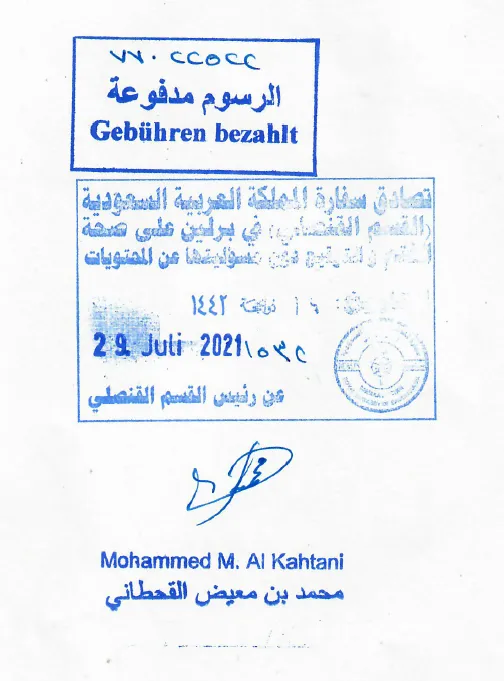
Schmidt & Schmidt covers the full spectrum of legalization services for documents issued in Saudi Arabia.
Saudi Arabia joined the Hague Convention on the Simplified Authentication of Documents on 19 October 2016; the Convention entered into force on 7 December 2022.
The apostille, or the “Hague apostille” is a certificate that authenticates the origin of a public document (e.g., a birth, marriage or death certificate, a judgment, an extract of a register or a notarial attestation). It confirms the authenticity of the signature and the authority of an official who signed the public document.
Documents issued in the Saudi Arabia are certified with an apostille in accordance with the Hague Convention of 1961 are recognized in all Member States of the Hague Convention and do not require any other form of certification, such as consular legalization, which considerably reduces the costs and time required for the certification of documents. So far, more than 120 states have joined the Convention.
The apostille is not sufficient for use in the states that are not party to the Hague Convention. In this case, consular legalization applies to a public document.
Designated Competent Apostille Authorities in Saudi Arabia
In Saudi Arabia, the responsibility for issuing apostille of documents falls under the competence of the Ministry of Foreign Affairs. The cost will generally depend on the degree of urgency, but will start from 30 Saudi Riyals.
The authority will carefully examine the document to verify if the signatures, stamps, or seals align with their own records. If they are confirmed to be authentic, the document will be legalized by affixing an 'apostille' (an officially stamped certificate).
The apostille in the Saudi Arabia is a square stamp in Arabic or English with the obligatory heading "Apostille" and a reference to the 1961 Hague Convention in French (Convention de La Haye du 5 octobre 1961). The apostille certificate’s sides will be at least 9 centimeters long.
Types of documents
| Can be apostillized | Cannot be apostillized |
|---|---|
|
|
Specific aspects and document requirements for the apostille in Saudi Arabia
Saudi Arabia is among the 120 countries that recognize and issue apostilles in accordance with the Hague Convention of 5 October 1961. The apostille serves as a confirmation of the official status of a document.
The apostille process can vary depending on the sender and recipient country, but typically to obtain an apostille for a document in Saudi Arabia, you must go through the following steps:
- Obtaining the original document to be apostilled;
- Verification of the signature on the document by the authorized body;
- Issuance of an apostille on a document by an authorized body;
- Submission of the document together with the apostille in the recipient country.
This process can be time-consuming, especially if it includes multiple documents and different countries. To ensure a smooth and accurate apostille process, it is recommended to seek guidance from specialists familiar with the requirements and procedures. Their expertise can help avoid delays and errors in obtaining documents apostille.
Document requirements that might apply:
- The document must be an original or a certified copy issued by the competent authority.
- The document should contain all relevant and accurate information.
- The document must be in the official language of the issuing country or translated into the official language of the country where the apostille is sought.
- The apostille must be affixed by the designated competent authority in accordance with regulations.
The apostille is issued in a uniform format. In Saudi Arabia, it has the form of a printed sticker with a handwritten signature of an official, an official seal, and a hologram.
In cases where apostilles are not recognized, holders of foreign documents will need to legalize them instead. However, If the country of destination of the document recognizes and issues apostilles, then legalization is unnecessary.
Legalization of Saudi Arabia educational documents for use abroad
For educational documents issued in Saudi Arabia, such as school reports, university degree certificates, transcripts of records, enrollment certificates, and other school or university certificates, to be recognized and valid abroad, they must undergo an authentication process through legalization.
When it comes to the authentication of diplomas and similar educational documents in Saudi Arabia, the applicants will usually need to do so through the Ministry of Foreign Affairs.
In addition, to simplify the process of authenticating foreign educational documents for use in Saudi Arabia, the Saudi Arabia Cultural Attache (SACA) now offers an online platform, Mosadaqa. This streamlines the initial phase of attestation which previously required an in-person visit to SACA. The service currently covers educational credentials from institutions in Egypt, Jordan, Iraq, and Palestine, and includes degrees ranging from college diplomas to PhDs. Plans are underway to include more countries soon.
Such an approach ensures that educational documents possess the necessary legal authority, allowing them to be recognized and used across various countries. While these are general procedures, the exact requirements may vary, so it is advisable to confirm the specific steps with the relevant authorities.
Procedure to obtain a criminal record certificate
- Visit your closest police station and submit a letter to the chief of the Criminal Evidence Division which indicates the purpose of your request. For instance the Institution or public authority requesting the criminal record certificate.
- If you are Saudi, bring your your original National ID Card and a color photograph (6*4 cm)
- If you are a registered resident in the Kingdom, bring your passport and a color photograph (6*4 cm)
- Your Fingerprints will be taken by the identity-vetting officer
- The acknowledgement of receipt is proof of application. The receipt will specify the date the criminal record certificate can be collected and will only be handed out upon presentation.
- If you lose the acknowledgement receipt, a letter must be submitted to the police station regarding the loss and shall be replaced after successful identification check
- Only with the acknowledgement receipt can the applicant receive the criminal record certificate
Authenticating your criminal record certificate
After ensuring eligibility with the country where the document is to be used, it must be authenticated by the Saudi Ministry of Foreign Affairs and by the Saudi Embassy or Consulate in the country of destination.
To obtain the apostille, one must submit the original document along with a copy to be authenticated and a completed application form. This form must be completed in english and contain information such as name, address, valid email-address and contact phone number. It is important to note that the apostille is only valid for one year.
Recognition of the authenticity of public documents
Documents from countries with which Saudi Arabia has agreements for exemption from legalization are not required to undergo any form of legalization procedures. However, Saudi Arabia is currently not a member of any relevant agreements apart from the Convention Abolishing the Requirement of Legalization for Public Documents.

Consular legalization of Saudi Arabia documents for use abroad
Consular legalization is the process of authenticating or certifying a legal document so a foreign country's legal system will recognize it as with full legal effect that is carried out by the diplomatic or consular mission of the country in which the document is to be used.
This procedure is required when the destination country does not recognize or accept the apostille certification. One needs to submit the original document, along with any required copies or supporting materials, to the respective consular office. The consular officials will review the document, verify its authenticity, and affix their seal or stamp to certify its validity.
The consular legalization process may require additional steps like obtaining translations of the document into the language of the destination country or providing additional supporting documentation as requested by the consular office.
It is up to the diplomatic mission to decide about the authentication procedure The specific requirements and procedures for consular legalization may vary depending on the regulations of the destination country.
The main differences between an apostille and consular legalization of documents
The common feature between apostille and consular legalization is that they authenticate an official document for presentation to institutions in another country. However, they have many differences.
| Apostille | Consular legalization | |
|---|---|---|
| Legal effect | Can be used in all countries that are party to the Hague Convention on the Simplified Legalization of Documents. | Use between States one or both of which is not a member of the Hague Convention, or where one of the contracting States has protested the accession of the other. |
| Difficulty | Moderate. To obtain an apostille, contact the competent apostille authority of the state of origin of the document. | High. For consular legalization, various inland authorities and a diplomatic mission of the state of destination must be involved. |
| Pre-certification | Usually not required. | Is obligatory. |
| Attestation at the state of destination embassy in the state of origin of the document | No need to contact the Consulate of the country of destination. | Is the final step of legalization. |
Apostille and consular legalization in all cities of Saudi Arabia
Schmidt & Schmidt provides apostille and consular legalization services for public documents originating from all regions across Saudi Arabia. We handle the entire process, from document review to obtaining the necessary certifications, ensuring that your documents are valid and recognized internationally. With our reliable services, you can confidently use your Saudi Arabia public documents abroad.
Procurement of documents from Saudi Arabia
If the important documents are lost or damaged, or current copies of the documents are needed, the re-issue of the documents is required. It is not unusual for people outside Saudi Arabia to encounter difficulties with obtaining new documents when abroad. Our consultants will help you procure new documents from Saudi Arabia remotely, and we can arrange for your documents to be sent by courier anywhere in the world.
Certified translation of documents from Saudi Arabia
Copies and transcripts of civil status documents can be translated into any language by a sworn translator in Saudi Arabia or the translation can be done in the country of destination. We offer certified translations of civil status documents with further certification. The cost of the work is calculated according to the volume of the document in question.
Does the translation have to be legalized?
Any foreign document issued in one country and used in another country must be legalized for use abroad. Therefore, the authenticity of a certified translation from Saudi Arabia needs to be certified by an apostille. Consequently, many authorities may not accept certified translations from Saudi Arabia if the translation has not been properly authenticated in Saudi Arabia for use abroad. To avoid this confusion, translations should better be made in the state of the destination of the document.

























































